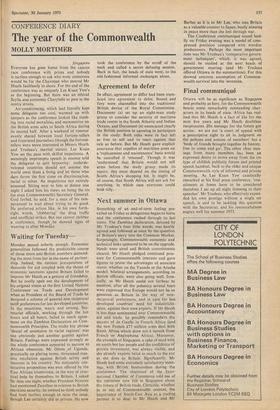Waiting for Tuesday—
Monday passed soberly enough. Economic generalities followed the predictable course of those more anti-British members demand- ing the most from her in the name of partner- ship. Indeed, the curious juxtaposition of demands for aid coupled with the threat of economic sanctions 'against Britain failed to impress Mr Heath as a gesture of friendship. But he coolly spelt out the development of his original vision at the first United Nations Conference on Trade and Development when as President of the Board of Trade he designed a scheme of general non-reciprocal tariff preferences for less developed countries. In the meantime, weary and unsung, Sec- retariat officials, working through the hot hours and all hours, failed to reach agree- ment on the Zambian Declaration on Com- monwealth Principles. The tricky key phrase 'denial of assistance to racist regimes' was too obviously just another gambit against Britain. Feelings were expressed strongly as the whole conference appeared to narrow to African obsession. Mr Obote of Uganda, practically on glaring terms, threatened mas- sive retaliation against British safety and interests in his country. No noticeably con- structive proposition was ever offered by the East African triumvirate, in the way of prac- tical help by themselves to Britain. I asked Sir Alec one night, whether President Nyerere had mentioned Zanzibar in relation to British maritime security; he seemed to think nobody had been tactless enough to raise the issue, though Lee certainly did in private. He now took the conference by the scruff of the neck and called a secret defusing session. Back in fact, the heads of state went, to the old-fashioned informal exchanges alone.

































 Previous page
Previous page